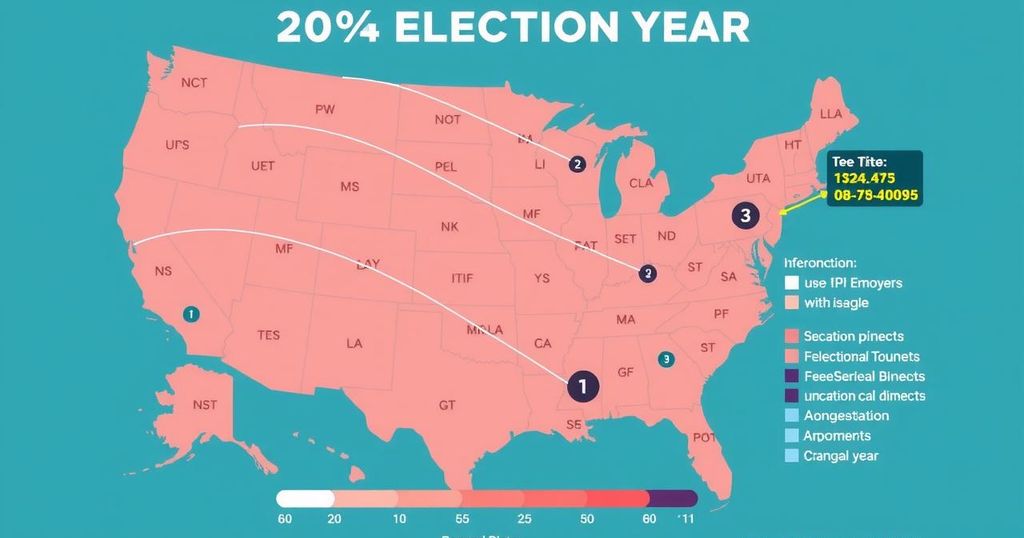2024 Elections: A Pivotal Year for Global Democracy

The year 2024 marked an unprecedented milestone in democracy, with nearly 3 billion votes cast across 73 countries. Despite historic participation, challenges such as declining trust in institutions and rising disinformation threaten electoral integrity. Shifts in political representation emerged, particularly with youth and women, alongside troubling irregularities in elections. The outcomes underscore democracy’s vulnerabilities and opportunities for reform and resilience.
The year 2024 emerged as a significant milestone in democratic participation, with approximately 3 billion voters engaging in elections across 73 nations, thus establishing it as the most extensive electoral year recorded in history. This unprecedented engagement spanned various levels, showcasing the profound impact of democratic processes on global political, social, and economic landscapes. For many participants, these elections were a first glimpse into the democratic experience, highlighting the system’s inclusive essence. However, the year was not devoid of challenges; a substantial portion of the electorate felt alienated from decision-making, with two-thirds of voters perceiving their voices as largely unheard within political spheres.
Challenges to democracy intensified as trust in institutions dwindled. Factors such as the proliferation of disinformation, political polarization, restrictive civic spaces, and the misuse of state resources by incumbents seeking to retain power contributed to this erosion of trust. The escalating role of social media and artificial intelligence further complicated the electoral landscape, amplifying misinformation and augmenting concerns regarding electoral integrity through disruptive technologies like deepfakes and targeted political advertising. Moreover, as dubbed the “super election year,” 2024 bore witness to substantial shifts in political dynamics, evidenced by frequent incumbents being ousted in favor of those who resonated more closely with public sentiment.
Despite these hurdles, signs of democratic resilience were evident, particularly in Africa, where a new generation of leaders emerged in nations such as Chad, Mozambique, and Senegal, indicative of a transition toward more inclusive governance. The potential for dialogue across differing political ideologies shed light on unity as a mechanism for safeguarding democratic norms, while the emphasis on inclusive policies offered pathways to address the concerns raised by the far-right movements that have gained momentum in regions like France and Germany. Nevertheless, systemic barriers against gender and youth representation persisted, with women’s legislative participation declining and younger leaders remaining significantly underrepresented.
In addition to the global changes in leadership and voter engagement, notable shifts in women’s representation were observed. While there were significant gains in certain countries such as Mongolia, which saw a remarkable increase in women’s parliamentary representation due to a newly implemented gender quota, others like Bhutan and Belarus experienced pronounced declines. Moreover, youth representation remained a pressing concern as the age gap between elected officials and the constituents they represent was evident, despite an observed marginal decrease in the average age of elected leaders across some nations.
The challenges surrounding electoral integrity cannot be overlooked. Reports of electoral irregularities, including accusations of vote-buying in Serbia and discriminatory voter identification laws in the United Kingdom, have intensified public skepticism regarding electoral processes. Furthermore, areas such as media neutrality faced significant difficulties, where traditional media’s impartiality was called into question and social media platforms played roles in deepening political divides and the dissemination of misinformation.
In conclusion, the elections of 2024 epitomized a complex tapestry of accomplishments and dilemmas within modern democracies. The historic participation of nearly 3 billion voters illustrated the power of citizen engagement in shaping nations. However, issues such as patronage politics, the erosion of institutional trust, and various socio-economic challenges underscore the need for institutional reform, enhanced transparency, and a more profound commitment to inclusive governance in the pursuit of renewed democratic principles and practices.
The year 2024 has been characterized by an extraordinary level of electoral activity globally, with nearly 3 billion individuals participating in the democratic process across 73 nations. This surge in voting has served to both expand the democratic engagement of citizens and illuminate the challenges that democracy faces today. These challenges range from issues of representation and trust in governance to the influence of technology, particularly the impact of misinformation propagated through social media. The elections of 2024 have emerged as a focal point for understanding contemporary struggles within democratic frameworks, underlining the significance of active citizen involvement in shaping political landscapes worldwide.
The electoral events of 2024 served to illuminate the dual narrative of challenges and triumphs in global democracies. With an unprecedented turnout reflecting the engagement of nearly 3 billion voters, the elections highlighted significant societal shifts while simultaneously exposing underlying vulnerabilities. Challenges such as misinformation, political polarization, and the continuing need for inclusive representation warrant concerted efforts for reform. Moving forward, the lessons drawn from the ‘super election year’ can guide the process toward revitalizing democratic practices and enhancing the quality of governance through equitable participation and representation.
Original Source: anfrel.org







